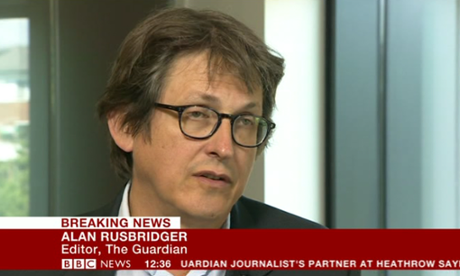
While capitulation on the part of the Guardian is not ideal, we’re ‘told’ they will continue to share the content of Snowden’s leaked documents. What develops from here and what pressures are exerted by the UK officials remains to be seen.
I don’t suppose it much matters how the NSA threatens reporters or the print media because the data is copied, shared, and no matter what happens to journalists or how many news outlets they shut down, there are always others chomping at the bit and ready to share the information with the public. AND, those who may end up with the data may not be as discerning as Greenwald and The Guardian editorial staff in the sharing. They might share even more incendiary information than has already made its way to us. Wouldn’t THAT be juicy?
It’s clearly no small crime the NSA has perpetrated or they would have let it drop long ago and would not have threatened other nations to turn over Snowden. It will be extremely interesting to see the final, global outcome of these revelations by Snowden and the US bullying of other nations to keep the truth hidden.
Guardian editor-in-chief says he agreed to ‘slightly pointless’ task because newspaper has digital copies outside Britain
Alan Rusbridger, the Guardian editor-in-chief, has said that the destruction of computer hard drives containing information provided by NSA whistleblower Edward Snowden allowed the paper to continue reporting on the revelations instead of surrendering the material to UK courts.
Rusbridger told BBC Radio 4′s The World at One on Tuesday that he agreed to the “slightly pointless” task of destroying the devices – which was overseen by two GCHQ officials at the Guardian’s headquarters in London – because the newspaper is in possession of digital copies outside Britain.
The move followed weeks of private discussions with Whitehall officials who eventually threatened legal action over the material “unless we handed it back or destroyed it”, he said.
“It was a rather bizarre situation in which I explained to them that there were other copies and, as with WikiLeaks, we weren’t working in London alone so destroying a copy in London seemed to me a slightly pointless task that didn’t take account of the way that digital information works these days,” said Rusbridger.
“Given that there were other copies and we could work out of America, which has better laws to protect journalists, I saw no reason not to destroy this material ourselves rather than hand it back to the government.”
Rusbridger added that the alternative to destroying the computer hard drives would be “essentially surrendering control of that material” to the courts while fighting a lengthy legal case with only a small prospect of winning.
“It seemed to me fruitless to go through that exercise of fighting that case, which would have meant that we could not write about the Snowden material when there were other copies. So it’s simply a matter of transferring our reporting to America,” he told The World at One’s Martha Kearney.
Rusbridger described as “alarming” the detention of David Miranda, the partner of Guardian journalist Glenn Greenwald, in Heathrow airport under Schedule 7 of the Terrorism Act for nine hours on Sunday.
Miranda is threatening legal action against the Home Office and the Metropolitan police unless they agree to return the electronic devices taken from him and not share any material taken from them with others.
“The problem is the use of this little-noticed schedule to the Terrorism Act, because what it does is to say that Britain’s ports and transit lounges in airports are an area of Britain where the normal rules don’t apply. I think that’s what has shocked the rest of the world,” said Rusbridger.
“If they were to arrest David Miranda in Heathrow car park they would have to use bits of the law which have checks and balances to protect journalistic material, among other things, but by doing it in a transit lounge they are operating in a kind of stateless way where they can interrogate someone for nine hours, seize whatever they want, under rules that are about terrorism. Once you start conflating terrorism and journalism, as a country I think you’re in some trouble.”
Rusbridger said the Snowden revelations had started a public debate about fears that the US and UK are on the road to “a much more complete regime of surveillance than anything that was imagined by anybody or by the laws that we have”.
“That argument was made to us early on that writing anything about this would be letting the bad guys in on the methods, and that is an effective way of shutting journalists up and saying let’s actually not have a public debate,” he said.
Source Article from http://2012thebigpicture.wordpress.com/2013/08/20/rusbridger-destroying-hard-drives-allowed-us-to-continue-nsa-coverage/
Views: 0
 RSS Feed
RSS Feed

















 August 21st, 2013
August 21st, 2013  FAKE NEWS for the Zionist agenda
FAKE NEWS for the Zionist agenda  Posted in
Posted in 
















